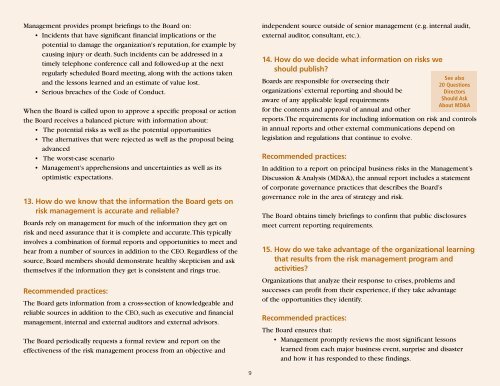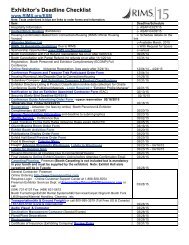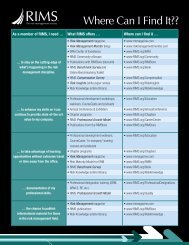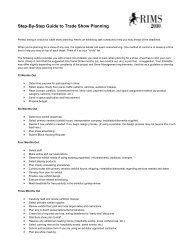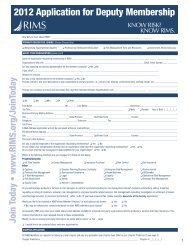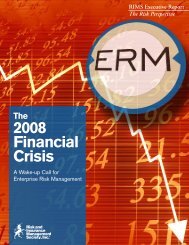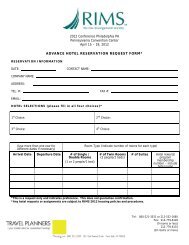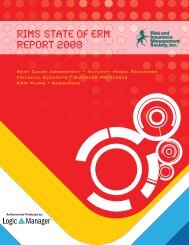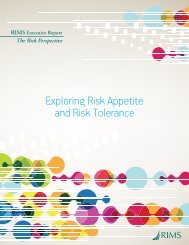Twenty Questions Directors Should Ask about Risk - RIMS
Twenty Questions Directors Should Ask about Risk - RIMS
Twenty Questions Directors Should Ask about Risk - RIMS
Create successful ePaper yourself
Turn your PDF publications into a flip-book with our unique Google optimized e-Paper software.
Management provides prompt briefings to the Board on:<br />
• Incidents that have significant financial implications or the<br />
potential to damage the organization's reputation, for example by<br />
causing injury or death. Such incidents can be addressed in a<br />
timely telephone conference call and followed-up at the next<br />
regularly scheduled Board meeting, along with the actions taken<br />
and the lessons learned and an estimate of value lost.<br />
• Serious breaches of the Code of Conduct.<br />
When the Board is called upon to approve a specific proposal or action<br />
the Board receives a balanced picture with information <strong>about</strong>:<br />
• The potential risks as well as the potential opportunities<br />
• The alternatives that were rejected as well as the proposal being<br />
advanced<br />
• The worst-case scenario<br />
• Management's apprehensions and uncertainties as well as its<br />
optimistic expectations.<br />
13. How do we know that the information the Board gets on<br />
risk management is accurate and reliable?<br />
Boards rely on management for much of the information they get on<br />
risk and need assurance that it is complete and accurate.This typically<br />
involves a combination of formal reports and opportunities to meet and<br />
hear from a number of sources in addition to the CEO. Regardless of the<br />
source, Board members should demonstrate healthy skepticism and ask<br />
themselves if the information they get is consistent and rings true.<br />
Recommended practices:<br />
The Board gets information from a cross-section of knowledgeable and<br />
reliable sources in addition to the CEO, such as executive and financial<br />
management, internal and external auditors and external advisors.<br />
The Board periodically requests a formal review and report on the<br />
effectiveness of the risk management process from an objective and<br />
independent source outside of senior management (e.g. internal audit,<br />
external auditor, consultant, etc.).<br />
14. How do we decide what information on risks we<br />
should publish?<br />
Boards are responsible for overseeing their<br />
organizations’ external reporting and should be<br />
aware of any applicable legal requirements<br />
for the contents and approval of annual and other<br />
See also<br />
20 <strong>Questions</strong><br />
<strong>Directors</strong><br />
<strong>Should</strong> <strong>Ask</strong><br />
About MD&A<br />
reports.The requirements for including information on risk and controls<br />
in annual reports and other external communications depend on<br />
legislation and regulations that continue to evolve.<br />
Recommended practices:<br />
In addition to a report on principal business risks in the Management’s<br />
Discussion & Analysis (MD&A), the annual report includes a statement<br />
of corporate governance practices that describes the Board’s<br />
governance role in the area of strategy and risk.<br />
The Board obtains timely briefings to confirm that public disclosures<br />
meet current reporting requirements.<br />
15. How do we take advantage of the organizational learning<br />
that results from the risk management program and<br />
activities?<br />
Organizations that analyze their response to crises, problems and<br />
successes can profit from their experience, if they take advantage<br />
of the opportunities they identify.<br />
Recommended practices:<br />
The Board ensures that:<br />
• Management promptly reviews the most significant lessons<br />
learned from each major business event, surprise and disaster<br />
and how it has responded to these findings.<br />
9


